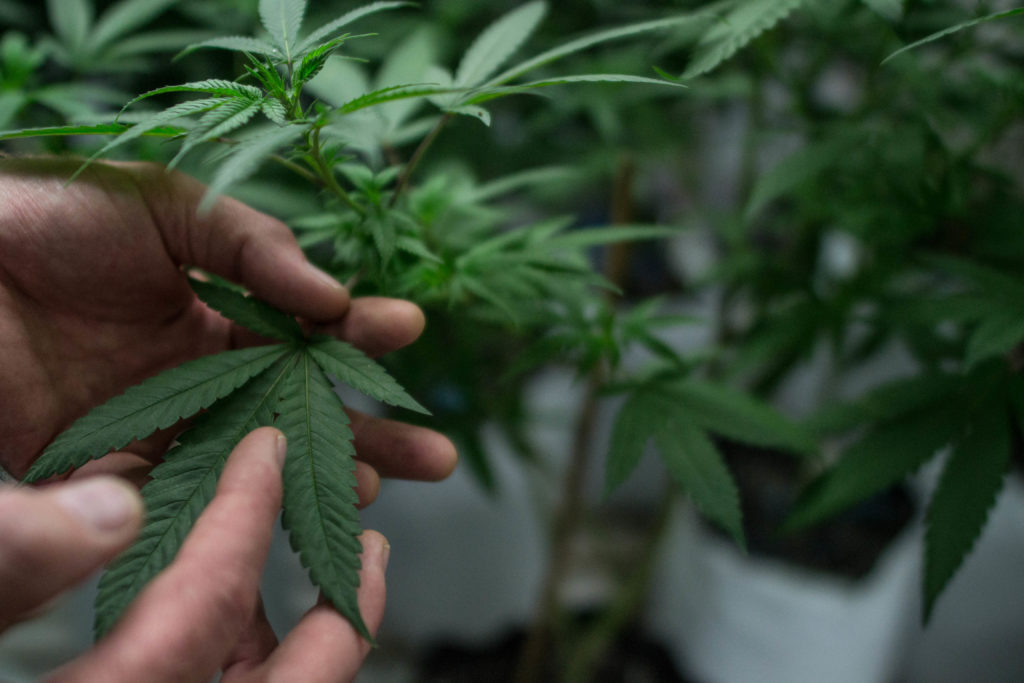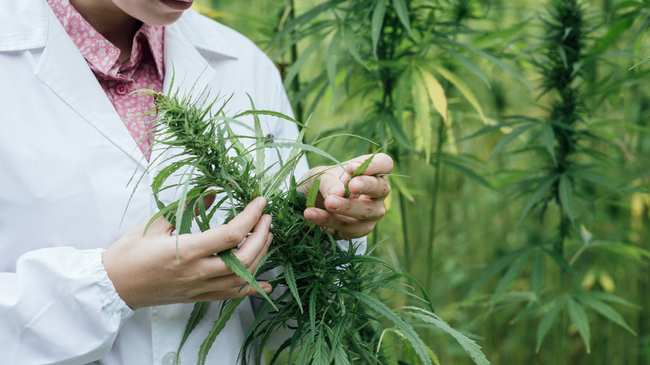|
The US Just Legalized Hemp, Which Is a Key Source of CBD
The Agriculture Improvement Act of 2018 is a breath of fresh air for hemp farmers and may pave the way for the rescheduling of CBD.

Image: Daniel Oberhaus/Motherboard
Cannabis containing extremely low amounts of the psychoactive compound THC, otherwise known as hemp, was officially removed from the Controlled Substances Act, the US Food and Drug Administration announced on Thursday.
The Agriculture Improvement Act of 2018 reclassified hemp—defined as cannabis containing less than 0.3 percent THC by weight—as an agricultural product, which means its production is now the purview of the FDA, rather than the Drug Enforcement Administration.
Although you can’t smoke hemp to catch a buzz, the plant has been used for centuries in products ranging from clothing to food. Hemp requires very little water to grow and is great for the soil, so it is widely considered an environmentally friendly alternative to many other crops.
These days, however, hemp is arguably best known as the source of CBD, a molecule found in cannabis that doesn’t give users a high, but a growing body of evidence suggests it might help alleviate symptoms for a wide variety of illnesses, ranging from anxiety and depression to arthritis and epilepsy.
Read More: Why You Can’t Legally Call Organic Weed ‘Organic’
Labelled the “new ‘it’ drug” by the Washington Post, CBD has come into vogue recently due to its claimed health benefits. Indeed, it’s legal in many states where medical and recreational weed remain illegal. Nevertheless, hemp has been federally illegal since 1970 due to its association with high-THC cannabis.
Although the new law legalizing hemp doesn’t formally legalize CBD on a federal level—it is still considered a Schedule I substance by the DEA—it is a significant step in that direction.
The new law appears to be an attempt by the FDA to regulate the burgeoning CBD market. Over the past several years, the FDA has issued a number of warnings to companies that market dietary supplements containing CBD on the grounds that they are not approved by the FDA to treat illnesses and often list inaccurate amounts of CBD on the label.

Image: Daniel Oberhaus/Motherboard
“We continue to be concerned at the number of drug claims being made about products not approved by the FDA that claim to contain CBD or other cannabis-derived compounds,” the FDA wrote in a statement. “The FDA requires a cannabis product (hemp-derived or otherwise) that is marketed with a claim of therapeutic benefit...to be approved by the FDA for its intended use before it may be introduced into interstate commerce.”
In June, the FDA approved the first drug that contains CBD for the treatment of seizures associated with rare forms of epilepsy. The agency said that “pathways remain available” for organizations seeking to introduce CBD-based food or medical products into the market, but that they will be subject to the same rigorous standards as other FDA-approved products.
In the meantime, the legalization of agricultural hemp will be a major boon to the hemp farmers who have been operating in a legal gray zone since the 2014 Farm Bill okayed its production in a narrow range of cases, including in states where it was legalized for research purposes.
While this allowed states such as Colorado to foster hemp production industries that are now worth over $800 million annually in the US, it also placed farmers in an awkward position. Even if hemp was legalized in their state, they still couldn’t engage in many of the activities needed to run a business that were regulated at the federal level, such as opening a bank account.
Read More: Colorado Hemp Farmers are Turning to Bitcoin to Ease Their Banking Woes
“Despite being able to legally participate in a 2014 Farm Bill-compliant hemp pilot program, every participating farmer took some sort of financial or otherwise substantial risk,” Colleen Lanier, the executive director of the Hemp Industries Association, said in a statement. “The hemp provision in the 2018 Farm Bill eliminates those risks in favor of full recognition as an agricultural commodity.”
TAGGED:
CANNABIS
FDA
CBD
HEMP
IS HEMP LEGAL?
IS CBD LEGAL?
2018 FARM BILL
AGRICULTURE IMPROVEMENT ACT OF 2018
Watch This Next
WEED
|
By Jacob Dubé
|
Oct 19 2018, 1:15pm
Canadian Researchers Are Stoked About Access to Legal Weed
Legal cannabis means more people will be able to access science-based information instead of relying on anecdotes from their local dealer.

Legal weed means more money for research on the plant. Image: Shutterstock
Canada’s legalization of pot this week isn’t just a boon to formerly closeted stoners—Canadian scientists are also stoked about easier access and better funding to the devil’s lettuce, kickstarting a new wave of cannabis research.
Research on cannabis has been going on in Canada for years. Several Canadian post-secondary schools already offer classes and degrees related to the industry, and schools such as McMaster University and the University of Guelph in Ontario have entire labs dedicated to cannabis.
But restrictions on obtaining the plant for research purposes continue to be a barrier. As a result, there’s a lot we still don’t know about cannabis—its genetic makeup and effects—compared to other, more easily studied plants.
Read More: Still More Evidence That All Weed Is the Same
“Just preliminarily, even getting data on this extraordinarily valuable crop proved very, very challenging,” said Sean Myles, research chair in Dalhousie University’s Department of Plant, Food, and Environmental Sciences, over the phone.
According to Myles, in the past it was difficult to find research partners that had the proper licenses to produce cannabis—most were only allowed to grow hemp, which doesn’t contain enough THC to make it worth lighting up or to research.
Now that cannabis is legal nationwide, Myles said that it will increasingly be treated—and studied—like any other organism.
“Most of the potential comes from the fact that you can grow large numbers of plants under controlled conditions, measure them, and do the kind of work that really opens [the research] up,” Myles said.
Myles said he’s wanted to study cannabis since as early as 2009. He and his colleagues had been focused on gathering the genetic information of different organisms—mostly apples and grapes—and thought that cannabis studies were an untapped area.
“What attracted us to cannabis in the first place is the fact that it's such an enormously valuable economic crop,” Myles said. “Cannabis has a tremendous value, despite having very poor genomic resources. The amount we know about genetics is way out of whack with its economic value.”
According to the business consulting firm Grand View Research, the global legal cannabis industry is set to be worth more than $100 billion worldwide in the next decade, and Statistics Canada reported that Canadians spent $5.7 billion on cannabis in 2017.
On the first day of legalization, CTV News reported that Alberta sold about $730,000 worth of the stuff on its online store.
But compared to other profitable crops such as rice and corn, which have been extensively researched for years, Myles says we still have a lot to learn about cannabis. There’s such a lack of information that we can’t even get the strains right.
Read More: The Best Science Stories to Read When You’re High
A 2015 study that Myles co-authored found that what’s marketed as C.Indica andC.Sativa, the two main strains of cannabis widely known by consumers, isn’t always based in biology but by their perceived effects. A strain called Cold Creek Kush, for example, could be produced and sold by multiple vendors with little biological similarities, but all be advertised as a stress-reliever.
For Amy Porath, the director of research at the Canadian Centre for Substance Use and Addiction, legalization means that more people will be able to access science-based information about cannabis instead of relying on anecdotes from their local dealer.
Last year, the CCSA released a report detailing its research priorities for cannabis in the next few years, which included its effects on the brain and a person’s mental health. Porath said she’s heard all sorts of false beliefs about cannabis—like it makes you a better driver (it’s still illegal to drive high) and prevents cancer.
“There is a lot of misinformation on the internet,” Porath told me. “There's a lot of mixed messages out there in the popular media, so there's a real need to have balanced, evidence-based public education for youth.”
Myles said that he’s excited that Canadian researchers will be able to work on the forefront of the huge scientific shift happening with cannabis.
The federal government, as well as private institutions, has been pouring money into cannabis research since legalization was announced in 2015. Last year, the Canadian government launched a research grant of $1 million ($766,000 US), giving up to $100,000 to ten cannabis-related projects, with at least one project specifically dedicated towards research involving Canada’s Indigenous peoples. In May, four researchers from the University of Alberta received $300,000 in cannabis-research funding through two private companies, Mitacs Canada and Aurora Cannabis.
“It's super exciting,” Myles said. “Like, this never happens. All of a sudden, there's an organism on the planet that's worth a tremendous amount, that nobody knew anything about, and you're allowed to investigate it with some pretty deep pockets behind it.”

No comments:
Post a Comment